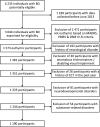Relationships between cognition, functioning, and quality of life of euthymic patients with bipolar disorder: Structural equation modeling with the FACE-BD cohort
- PMID: 39543921
- PMCID: PMC11730061
- DOI: 10.1192/j.eurpsy.2024.1789
Relationships between cognition, functioning, and quality of life of euthymic patients with bipolar disorder: Structural equation modeling with the FACE-BD cohort
Abstract
Background: Quality of life is decreased in bipolar disorders (BD) and contributes to poor prognosis. However, little is known about the causal pathways that may affect it. This study aimed to explore health-related QoL (HRQoL) in BD and investigate its relationship with cognition and psychosocial functioning.
Methods: This multicenter cross-sectional study used a neuropsychological battery to assess five cognition domains. Functioning was evaluated using global and domain-based tools, and health-related HRQoL was assessed using the EQ-5D-3L. Structural equation modeling was used to test whether the association between cognition and HRQoL would be mediated by functioning in BD while controlling for covariates such as residual depression, anxiety, antipsychotic medication, and psychotic features.
Results: We included 1 190 adults with euthymic BD. The model provided a good fit for the data. In this model, the direct effect of cognition on HRQoL was not significant (β = - 0.03, z = -0.78, p = 0.433). The total effect of cognition on HRQoL was weak, albeit significant (β = 0.05, z = 3.6, p < 0.001), thus suggesting that cognition affected HRQoL only indirectly through functioning. Anxiety was associated with decreased functioning (β = -0.27, z = -7.4, p < 0.001) and QoL (β = -0.39, z = -11.8, p < 0.001).
Conclusions: These findings suggest that improving cognition may not directly lead to a higher HRQoL. Cognitive remediation is expected to improve HRQoL only through functioning enhancement. They also reveal the potential importance of functional remediation and reduction of comorbid anxiety symptoms in improving HRQoL in BD.
Keywords: antipsychotic; anxiety; bipolar disorders; cognition; depression; psychosis; quality of life.
Conflict of interest statement
The authors declare no competing interests exist.
Figures


References
-
- Yen C-F, Cheng C-P, Huang C-F, Yen J-Y, Ko C-H, Chen C-S. Quality of life and its association with insight, adverse effects of medication and use of atypical antipsychotics in patients with bipolar disorder and schizophrenia in remission. Bipolar Disord 2008;10:617–24. 10.1111/j.1399-5618.2007.00577.x. - DOI - PubMed
Publication types
MeSH terms
LinkOut - more resources
Full Text Sources
Medical

